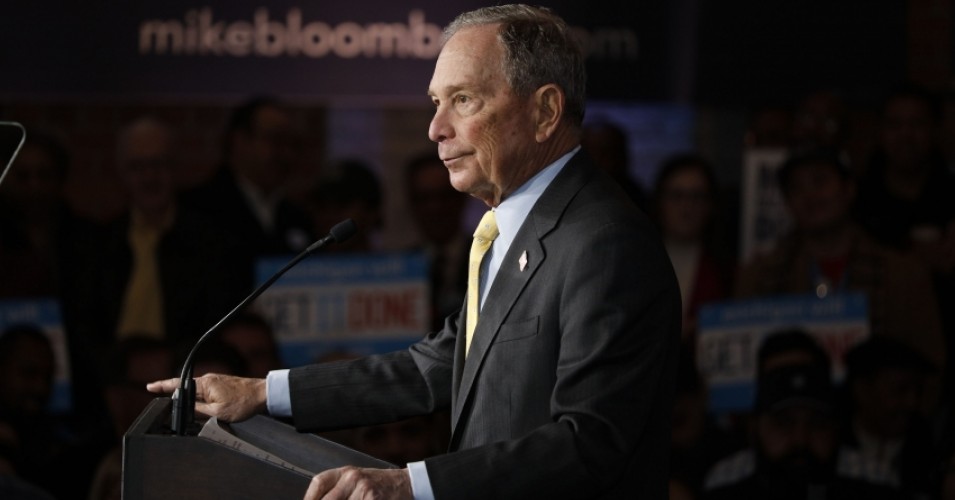


By Dr. Paul Heideman
Scholar in American Studies
In the wake of Tuesday night’s Iowa caucus results debacle, one question has been on everybody’s mind: Is Michael Bloomberg an oligarch?
The query was first raised by Bernie Sanders’ campaign co-chair Nina Turner, in the course of an interview by MSNBC host Chris Matthews. Her description of Bloomberg as an oligarch buying his way into the Democratic debates prompted a spirited defense of the media mogul from The Root’s political editor Jason Johnson. Johnson objected that “Oligarchy in our particular terminology makes you think of a rich person who got their money off of oil in Russia, who is taking advantage of a broken and dysfunctional system.”
This is a strange defense. Aside from the mention of Russia, a subject known to elicit unbalanced responses from liberal commentators, the description fits Michael Bloomberg pretty well. He is indeed very rich, and it can scarcely be denied that he is taking advantage of a broken and dysfunctional political system. Johnson implicitly acknowledged the latter, effectively arguing “hate the game, not the player.” But the problem with this argument is that Michael Bloomberg has long been fighting to preserve the rules of the game that have made him so obscenely wealthy. He’s been acting, in other words, like an oligarch.
Making Bloomberg
Bloomberg is famous for being something of a political chameleon. He was a Democrat for most of his life, became a Republican to run for mayor of New York in 2001, became an independent in 2007, and then became a Democrat again in 2018, apparently in response to President Trump. But throughout all of these changes, one thing has remained consistent: his devotion to the interests of the wealthy.
Bloomberg came into office in 2002 promising to run New York City like a business, and he delivered. He immediately offered city unions contracts with pay raises, but demanded concessions on pensions and healthcare, just as private sector companies have been demanding from unions for decades. At the next round of contract negotiations, when the costs of these concessions became clear to teachers’ union members and they demanded more, Bloomberg simply refused to bargain with them.
He also got rid of pesky democratic impediments to enacting his neoliberal agenda. He placed city schools under mayoral control, eliminating local school boards and implementing policy instead through the Panel on Education Policy, whose members he appointed. At the same time, Bloomberg’s administration expanded charter schools in the city, further putting education under private control. Like a good businessman, he accompanied this privatization blitz with a public relations campaign, expanding the Department of Education’s PR staff from 4 to 23.
Throughout his administration, Bloomberg was also a vocal defender of the interests of the rich. In classic trickle-down fashion, he argued that helping the poor was best accomplished by helping the rich. Want to address poverty? “Attract more very fortunate people. They’re the ones who pay the bills,” he said in 2013. When the 2008 financial crisis hit, Bloomberg ran interference for the banks, repeating right-wing lies that blamed fair housing laws for the mortgage meltdown. When Occupy Wall Street put inequality into the national spotlight, Bloomberg dismissed the protests, arguing that the country had been “overspending” and social services should be cut. And though he’s singing a different tune now, in 2012 he was a dogged opponent of raising the minimum wage.
It would be bad enough if Bloomberg were just a New York problem. However, because of his vast wealth, Bloomberg has secured a role as a player on the national stage, backing politicians and causes that protect the wealth of the billionaire class. He supported George W. Bush for reelection in 2004, after Bush passed massive tax cuts for the rich. He donated money to the late Sen. John McCain (R-Ariz.) and backed a host of ultra-conservative politicians, ranging from religious zealot Sen. Orrin Hatch (R-UT) to racist loudmouth Rep. Peter King (R-NY). Though he donated to Democrats as well, up until the 2018 midterms, Bloomberg’s super PAC Independence USA spent more money funding the campaigns of Republicans than Democrats.
Oligarchy in action
Now, Bloomberg is running for the Democratic nomination for president. As with the rest of his political career, he’s running entirely on the support of his personal wealth. So far, he’s spent more than $300 million of his personal fortune on his campaign. And following the Iowa caucus debacle, Bloomberg announced he would be doubling his ad spending.
What’s more, Bloomberg has been able to use his obscene wealth to shift the institutional field to his favor. He has picked up a number of endorsements from prominent mayors in whose cities he spent philanthropic money, such as Michael Tubbs of Stockton, California and Greg Fischer of Louisville, Kentucky. Other endorsements have come through mayors who received training in Bloomberg’s Harvard City Leadership Initiative.
Even more outrageously, the Democratic National Committee recently eliminated the donor number requirement from the Nevada debate, allowing Bloomberg on the stage even as other candidates were eliminated by the DNC’s strict debate rules. Bloomberg’s money just doesn’t buy him a campaign—it buys his campaign the ability to change the rules.
Michael Bloomberg is, therefore, a perfect example of a “rich person…taking advantage of a broken and dysfunctional political system.” It’s worth remembering that in other countries, Bloomberg wouldn’t be able to throw his wealth around like this. In Canada, for example, candidates and parties are bound to maximum spending limits, scaled to the population of the electoral district in which they’re competing. Not so in the United States, and Bloomberg has taken full advantage.
For his entire career in politics, Michael Bloomberg has backed policies and politicians that protect his fortune. In doing so, he has acted exactly as an oligarch does. The term “oligarch” dates back to ancient Greece. There, Aristotle used it to describe a government which the rich control in their own interests. This has been Bloomberg’s approach to government throughout his career. It’s the game he plays, and anyone who wants to change it will learn very quickly that he is not on their team.
Published by Common Dreams, 02.12.2020, under the terms of a Creative Commons Attribution-Share Alike 3.0 license.
